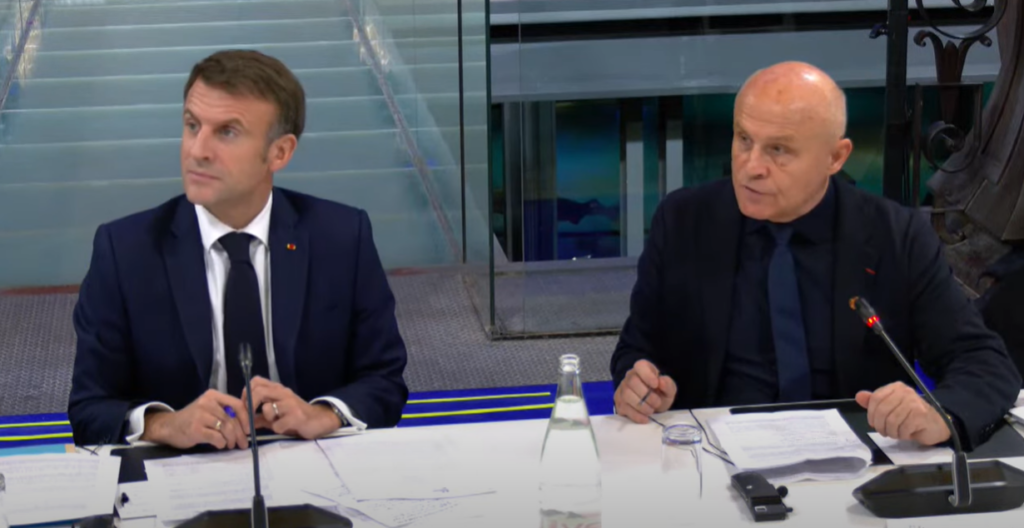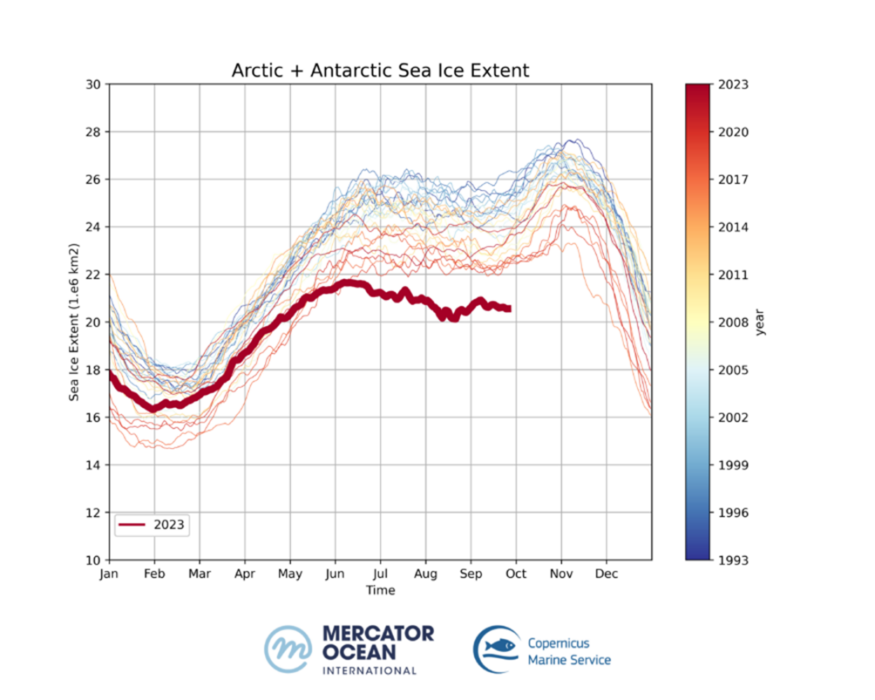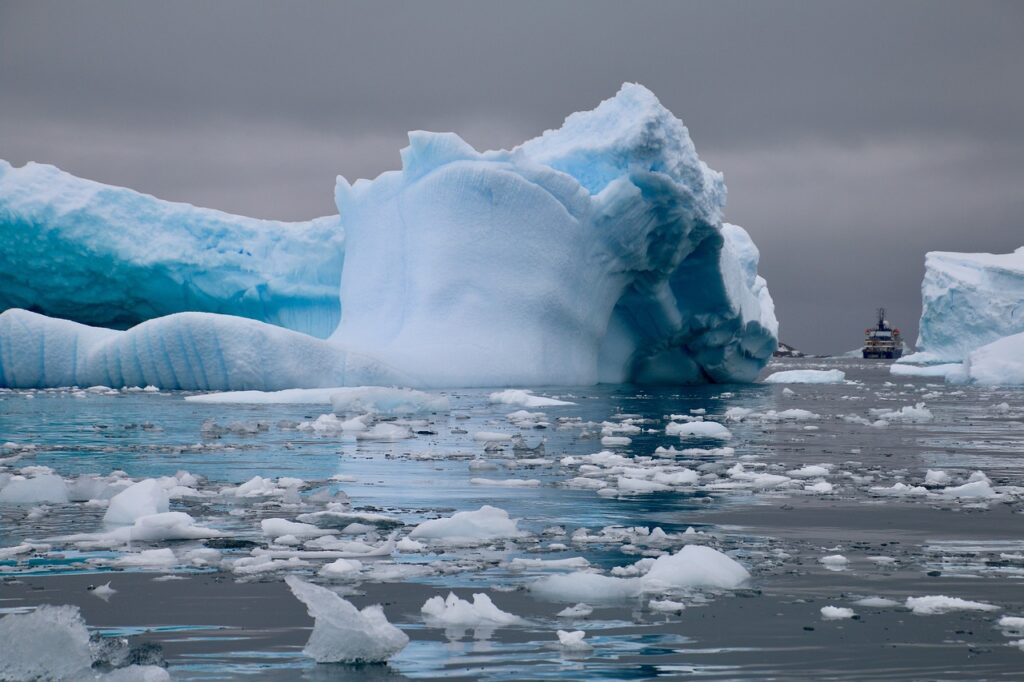The One Planet Polar Summit was held in Paris from November 8 to 10 as part of the Paris Peace Forum. It marks a decisive step towards protecting the polar and glacial regions, i.e. the cryosphere. Initiated by French President Emmanuel Macron and organised by Olivier Poivre d’Arvor, Ambassador for the Poles and Maritime Issues, the event brought together over 700 researchers, scientists and political decision-makers from around the world to draw up a plan for global initiatives to safeguard the cryosphere, in the form of the Paris Call.

The cryosphere today: alarming figures
The cryosphere is the part of the Earth where water is present in a solid state, in the form of ice or snow. As explained in the Paris Call for Glaciers and Poles, the findings of cryosphere researchers taking part in the One Planet Polar Summit highlight the alarming impact of climate change on these vital areas, which cover 10% of the Earth’s surface. Glaciers are losing mass on a massive scale, surface temperatures in the Arctic have risen by up to four times the global annual average over the past forty years, and sea ice is at historic lows. The consequences range from the threat to emperor penguins to the impact on the drinking water supply of two billion people, particularly in South Asia. Melting glaciers are also causing sea levels to rise. Experts stress the urgent need to reduce greenhouse gas emissions: “without rapid global mitigation efforts, upper estimates of greenhouse gas emissions from thawing permafrost during the course of this century could significantly reduce the ability to limit warming to 1.5 degrees C.”
According to reports by Mercator Ocean International (MOi) experts, based on data from the Copernicus Marine Service, this year there was a drastic drop in sea ice on a global scale caused by a combination of the now usual major melting during the northern hemisphere spring in the Arctic, and the significant lack of sea ice growth during the southern hemisphere autumn in the Antarctic.

The Arctic Ocean in figures
- On the 12th of September 2023, Arctic sea ice extent reached its annual minimum, reaching 3.9 million km2, which is 1.7 million km2 less compared to the long term average (1993-2010). This corresponds to a sea ice loss of 2.8 times the size of France (all regions).
- In 2023, the September Arctic Sea ice volume minimum hit a historic record-low of 3 200 km3. The last 17 annual minimum Arctic sea ice extents are also the lowest 17 ever observed (since 1979).
More information on the Arctic Ocean
The Antarctic Ocean in figures
- Antarctic sea ice reached the lowest sea ice extents ever observed (on satellite record) for the months of June, July, August, and September of 2023. September 2023 is first time that Antarctic sea ice extent is below 17 million km2 since the first satellite observations (e.g. 1979).
- This year , Antarctic sea ice has reached its maximum annual extent on the 7th of September, extending to 16.8 million km2, which is 1.9 million of km2 less compared to the 1993-2010 average for the same date. This corresponds to a sea ice loss of 3 times the size of France.
- More than 6 000 km3 of Antarctic sea ice has been lost in 2023, compared to the long-term average (1993-2010); This is equivalent to a sea ice loss of 67 times the volume of Leman Lake near Geneva (89 km3).
More Information on the Antarctic Ocean.
The Paris Call, a French initiative for a global, polylateral mobilisation
Faced with this critical situation, several countries and international organisations[1] have approved the Paris Appeal for Glaciers and Poles. This Call brings together a number of commitments and actions crucial to the preservation of the cryosphere, in a context of triple crisis caused by climate disruption, loss of biodiversity and pollution. Two key points are particularly highlighted: the need to deepen scientific knowledge, and the need to amplify international efforts.
We encourage nations and all relevant organizations such as the European Union to continue to work together in the scientific field, to jointly finance research, monitoring and protection programmes for the cryosphere, to support data sharing to allow all countries access to the latest information on the state of the cryosphere and its specific ecosystems”

The Paris Call is a call for imminent international mobilisation and cooperation, to deepen research, act to reduce greenhouse gas emissions, preserve biodiversity and apply sustainability standards to preserve the cryosphere in the contexte of the challenges of climate change. This is an unprecedented polylateral mobilisation for the poles and glaciers: as Pascal Lamy, President of the Paris Peace Forum, which hosted the One Planet Polar Summit, explains, polylateralism broadens the traditional concept of multilateralism by involving not only governments, but also a multitude of players such as science, NGOs, the financial sector and many others. This approach fosters collaboration between these different entities to solve complex global problems, recognising the need for diversified participation to address contemporary challenges on a global scale.
French President Emmanuel Macron has announced that negotiations will continue at a forthcoming Summit under the Norwegian Presidency of the Arctic Council in a year’s time, and probably at the United Nations Ocean Conference in June 2025, co-hosted by France and Costa Rica. “It is through this regular follow-up that we can continue to achieve concrete results,” asserted the French President.
Operational oceanography at the service of the Paris Call
The first One Planet Summit was held in Paris in 2017, the first One Planet Ocean Summit in Brest in 2022, the first One Planet Polar Summit in November 2023. These summits have all succeeded in achieving a vast international mobilisation, informed by science. As an international leader in ocean forecasting and the digital ocean, Mercator Ocean International supports the Paris Call for Glaciers and Poles and is committed to putting its expertise at the service of ocean knowledge of the poles, in particular to produce reliable and accurate data and indicators, such as its recently published bulletins for sea ice (Arctic and Antarctic) publiés récemment. MOi will reinforce this commitment not only with the future Digital Twin of the Ocean, currently being designed within the framework of the EU Ocean Mission, at the request of the President of the European Commission, Ursula von der Leyen, but also thanks to the unprecedented mobilisation of the global ocean forecasting community within the framework of the United Nations Decade of Ocean Science for Sustainable Development (OceanPrediction Decade Collaborative Centre).
Useful links
- Press release: Paris Call for Glaciers and Poles – Declaration for the One Planet – Polar Summit
- Sea Ice in the Arctic continues to decline
- Antarctic Sea Ice Reaches Lows Never Before Observed
[1] Australia, Bangladesh, Belgium, Bulgaria, Cape Verde, Chile, Cyprus, Comoros, Croatia, Estonia, France, Germany, Guinea, India, Italy, Japan, Kyrgyzstan, Liberia, North Macedonia, Monaco, Montenegro, Pakistan, Peru, Singapore, South Korea, Spain, Switzerland, Tuvalu, Ukraine, United Kingdom, Uruguay.
United Nations Scientific, Educational and Cultural Organisation; World Meteorological Organisation.

